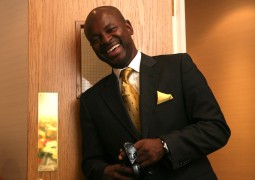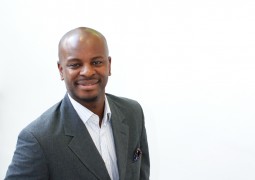Biohacking and Thomas Landrain
by 0

‘You will be able to grow your ink at home.’
We had a pleasant interview with co-founder and president of La Paillasse, the first French and world largest community lab that fosters open science and technology Thomas Landrain on biohacking during her visit to Turkey.
How do you define biohacking from your point of view?
When you talk about hacking people think very negative. According to my perspective biohacking is being autonomous in front of knowledge and technology. You assemble notions or modules and reassemble them differently as they have been before. You need creativity. The machine doesn’t own you but you own the machine. It is a very positive process that is giving you independence in front of the computer and you are not manipulated. We are here to re-appropriate biology in a different way where academies or the pharmaceutical private companies have done so far. We like people to try themselves what they can do with biology and discover what biology can offer them.
You mention that ‘Machine doesn’t own you but you own the machine’. People talk about the concept of singularity. There will be no boundaries between a machine and human.
Technology has never been so much around us then today and will be more tomorrow. What I can perceive according to the trends AI, for example, will help the technology to go out of sight. What we do today will be more natural, we will not be using buttons etc. There will be movements and interaction so that the human-machine relationship will be more natural. We shall not perceive all the actions that the machines are doing for us. They will be there to help us and they will adapt us. If there is a risk in the future, biohacking in terms of philosophy is good. It teaches you not to trust black boxes. At least to understand how things work. You can customize them if necessary.
You say that ‘Machines will be there to help us not to take over’. We have to get used to the black boxes and try to understand what’s going on there. One of your priority is the open science. Why is open science so important to you?
I always have been interested in science when I was small. I was a geek studying everything. I was wondering the universe and I understood that the mystery of the universe is the life itself, so I chose to study life. Science is important to humankind. We create knowledge and it can be transferred to help us to understand the reality behind things, whether you can take it for real or not. That enables you to make actual choices in life. It’s like the black box machines, you wonder how the world works and you open it bit by bit. So you can adopt yourself better if you know how it works.
Billions of dollars are spent for research, everybody wants to create technology, new products, knowledge and validate knowledge. This process requires a lot of creativity, intelligence and time. Those efforts are not given in an optimal way. Scientists are slaves to machines especially biologists. You put your material in a machine push a button and wait for the result. Of course, you have some knowledge but a process is being done behind. You can quantify the process and you cannot compare the performance between the machines for the same action. So you cannot merge them in the future. Here there is a mission to make open science make more efficient science. Science already costs a lot. We can get more for the same price.
Open science means also open to anybody. There are many people, who have technical skills, some went to college some not. There is no monopoly on great ideas. Especially in a world of collective intelligence.
La Paillasse is about giving the opportunity to actual science and product that are done in labs. We believe they can be done also in labs where professional people are not working. We want to be surprised. I also surprise myself when I see I am doing the things that I am not supposed to do. I evaporative this to anybody. If you give the resources, chance and the mindset of people, they can achieve a lot of things. It is all about the eco-system and the environment you provide.
Research labs work only with researchers with very strict rules and they are the closed society. Scientists have hard times to collaborate with the industry. You cannot have the skills for everything. You may need to access the skills and resources that complete you. Academies try to do that as the way they are structured today but they are not efficient. Resources can be distributed and be used concentrated where they are needed, not necessarily only in the academic labs.
Is it like Makers Movement?
Absolutely. We share the same philosophy with the maker movement.
How do you help people that have ideas?
There are many ways to interact us. La Paillasse labs are a small community of people with common interest. We have Artificial Intelligence lab, CogLab for cognitive designs, BioLab, Textile Lab, GhostCityLab etc. GCT is for the people who have an interest in abandoned cities. They make thought to renew and reuse them. We have fifteen different labs. A lab is in general between 10-50 people. The idea is them to meet, make projects, workshops and conferences together. One of our mission is to stimulate the approach experimenting freely. We also created an incubator. If you want to develop your project full-time then you pay for it. You pay a very limited amount of money compared to other solutions. In this case, we request the knowledge of running a project.
Does your government support start-ups when you compare with the US for ex.?
Absolutely especially Paris. There are lots of incubators, especially in the digital technology field.
We have a special feature as we support amateur and professional start-ups at the same time at the same place, not only the digital more related to biology, ocean exploration to space exploration. We try to be open.
I went to the US when I was a researcher. I visited MIT, Stanford, and Princeton. When you go there they have wonderful people, it is attracting. You feel you can do anything like you can have access to anything, resources, machines etc. You just think about your projects and how to do it. It is a very good mindset, it is transformative. It’s good to think without constraints.
Do you believe in University, Masters, and Ph.D. degree? For ex., PayPal co-founder Peter Thiel says “the key to quicker business innovation is skipping college”. His foundation is handing out $100,000 to 24 people under 20 to drop out of college for two years and start companies. What is your opinion on that?
I believe University a place you can focus on learning and experimenting. However so far I also had experiences good and bad. I cannot say that they are good at understanding what is good for students. They have a kind of mass-production mission. A person has more chance when a person can be different than others. I went to a private university, then a prestigious public economic school, which I was not very satisfied because they do not accompany students. They do not provide enough sources. Private university had more resources.
There is a theory that students will begin to pick their professors independent of school. Do you think the education system will change in the future?
Definitely. I hope it will happen. I was very bad at the school. I was asking questions unrelated to the program. It was disturbing to the teachers, either they did not know or they were not interested in the area. In the future, we can transform the traditional way to a much more efficient way.
Tell me about ‘living colors’.
The project started two years ago. I liked the idea of having objects from living organism. Ink is actually very expensive and very polluting. I thought it may be possible to produce an ink out of the living organism. I wanted to show how to grow ink at home.
It sounds weird to grow your own ink at home.
I analyzed microbes and found out one that produces magnificent blue dye. We could transform it into an ink then. At home, I have some pens with that ink. It’s not commercial yet but we made workshops to kids to teach how they can grow their ink at home. It can be an alternative to petro chemistry. Today we have five colors. We do experiments on textile and printers. We try to die textile without water. From an environmental point of view, the textile industry is using water too much.
Are the colors unique or can you produce the same color? Is the life cycle same as ordinary ink?
They won’t be the same for sure but similar. The lifecycle is short for now. Some dyes are stable some are not. Blue dye has a remarkable durability like we tested two years ago and it is still there.
But they need to stay like hundreds of years, right?
Not necessarily. We mostly use inks for very temporarily purposes. If you have something that shall stay forever then you can use special inks that can last longer. For ex. imagine the newspapers and the amount of ink that is used for them.
Tell me about ‘Do it yourself biometric devices’?
I want to quantify myself to get some insights to adapt my condition. I use gadgets to gather information. So I like to think the same process and enable the feedback. I want to know more about myself. They do not alert you when you are sick this approach is proactive. Everybody is different. So in the future, we will see more devices in the body for ex. Ones that can make blood analysis real-time. So people can be aware of their illnesses sooner and get prepared for it.
Thank you very much.
My pleasure.





